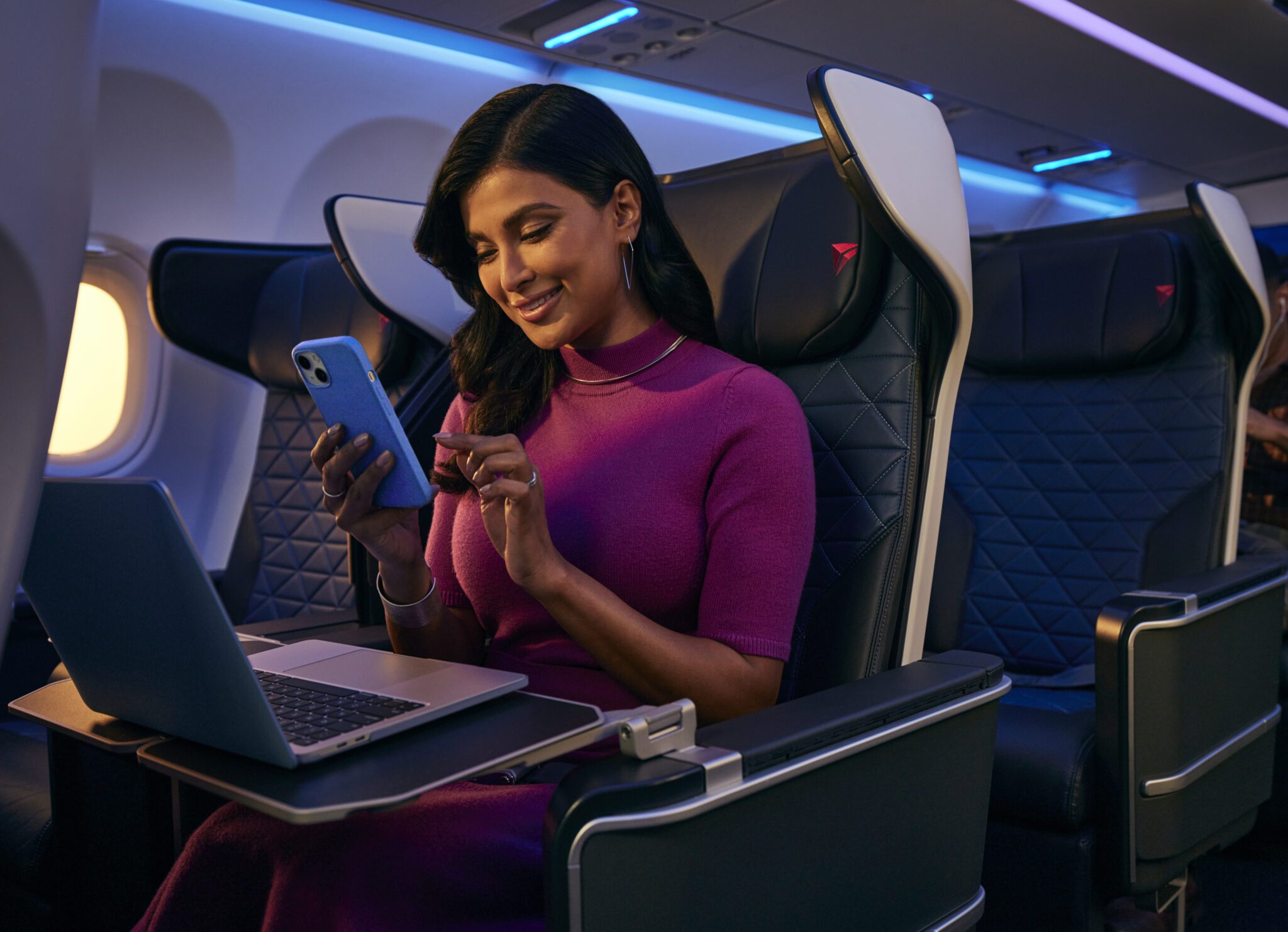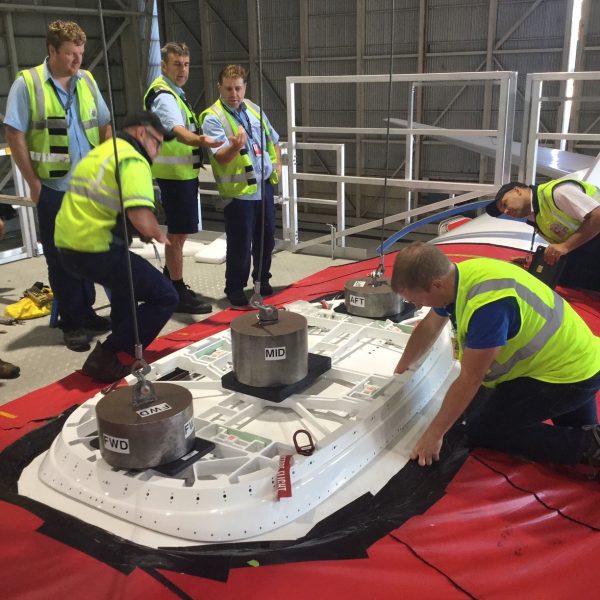Delta’s Free Wi-Fi Goes Global — How Do Other Airlines Compare?

Skift Take
After a July it would rather forget, Delta Air Lines is working hard to restore its reputation as an aviation innovator. The U.S. carrier is launching free onboard Wi-Fi across its global network in the coming months, with many major markets enjoying the perk within a matter of weeks.
In partnership with T-Mobile, Delta's goal is to bring reliable, streaming-quality connectivity to its entire fleet. The airline already offers free Wi-Fi on around 90% of its 700 domestic mainline aircraft, with plans to boost this figure further by the end of the year. Smaller regional planes are also being upgraded.
However, international expansion is much more complex. Long-haul flights often pass over large bodies of water and sparsely populated areas - locations that have traditionally been beyond the reach of fast onboard connections.
What is Delta Doing With Wi-Fi?
New generation satellite-based systems are sparking a revolution in onboard connectivity, with many airlines investing heavily in the tech.
Delta is currently undergoing what it describes as a “Wi-Fi transition period.” Put simply, it means massive improvements are coming, but there are still gaps in its global coverage. Additional satellites are being positioned to boost the reach of the service, but connectivity could be patchy until then.
The airline has a dedicated section of its website to help passengers with the likely internet options onboard their next flight.
To manage expectations, Delta is launching free international Wi-Fi on a route-by-route basis. The carrier is mirroring its successful domestic rollout strategy where select city pairs were prioritized.
While Ranjan Goswami, Delta’s SVP of Customer Experience Design claims the speed of the rollout is “unmatched in the airline industry,” it hasn’t been entirely trouble-free. At the CES Las Vegas tech show in 2023, the company said international and domestic aircraft would be equipped by the end of 2024. Based on current timelines, the project will continue into late 2025 and potentially into 2026.
| Wi-Fi Rollout Begins: | On Viasat-Equipped Routes To and From: |
|---|---|
| August 2024 | United Kingdom, Germany, Netherlands, Spain and Italy |
| September 2024 | Iceland, Ireland, Israel, Belgium, Czech Republic, Denmark, Greece, Portugal, Sweden and Switzerland |
| October 2024 | South America (Brazil, Argentina, Chile, Colombia, Ecuador and Peru) followed by Hawaii |
| December 2024/January 2025 | Nigeria, Ghana and Senegal |
| Mid-Late 2025 | Transpacific region (including Asia, Australia and New Zealand) and South Africa |
Expected timeline, subject to change. Source: Delta Air Lines
With Delta a key sponsor of Team USA, aircraft serving French destinations were upgraded ahead of the Paris 2024 Olympics.
The Loyalty Factor
Delta’s SkyMiles loyalty program has been central to the rollout of its domestic Wi-Fi offering. The airline requires all passengers wanting free connectivity to log in or register as a member.
Notably, Delta says its international Wi-Fi portal will not require a SkyMiles number during the introductory period. However, as the rollout matures, all planes with the new Viasat Wi-Fi system will need a passenger’s membership details to unlock the onboard internet.
How Other Airlines Compare With Wi-Fi
While Delta considers itself a pioneer in the space, it is far from alone in offering international Wi-Fi at 35,000 feet. With the caveat that connection speeds can vary wildly, here’s how some of its major long-haul competitors currently shape up:
American Airlines:
When flying within the U.S., American offers ad-sponsored Wi-Fi across its domestic narrowbody fleet. The carrier claims to be the first in the country to provide 100% streaming capability. However, the situation for international flying is currently less impressive.
In contrast to its domestic offering, American’s Boeing 777 and 787 fleet relies on older technology with generally slower speeds. The airline is promising faster Viasat connectivity on its new planes, but many existing aircraft will maintain the previous-generation system, albeit with improvements.
Unlike some competitors, American does not offer free international Wi-Fi as a perk in its premium cabins, or to passengers with top status in its AAdvantage loyalty program. The airline encourages travelers to visit this webpage to find out what onboard connectivity is available on a given flight.
United Airlines:
On U.S. domestic flights and short-haul international services such as to Canada and Mexico, United charges $10 for Wi-Fi. This is discounted to $8 for its MileagePlus members. The pricing for long-haul trips is determined by the length of the flight. United also offers day passes as well as monthly and annual subscription options. Packages on its global network start at $69 a month.
United’s diverse long-haul fleet relies on multiple different internet providers. This lack of standardization means access and speed can vary not only route by route but also from flight to flight. As a workaround, the airline provides a map showing the various coverage areas.
Air France:
The French flag carrier says that 90% of its planes are Wi-Fi equipped with more to follow in the coming months. The company is also investing in new satellite connectivity to bolster the performance of planes already fitted with older onboard internet hardware.
As for consumer-facing products, Air France offers an entry-level ‘Message Pass’. This is free and allows the use of text-based communication apps. Two further plans - Surf Pass and Stream Pass - can be purchased for part or all of the flight. Pricing varies depending on the length of the journey and typically ranges between €3 and €30 ($3.29 and $32.85).

British Airways:
British Airways is rolling out Wi-Fi across its short and long-haul fleet, with the majority of aircraft now connected. Like Delta, it uses its loyalty program as a sign-up tool. Executive Club members get free access to a messaging package for text-based apps. The service costs between £1.99 and £4.99 ($2.56-$6.42) for non-members depending on the length of the flight.
A more powerful ‘browse and stream’ option is only free for First Class passengers. It is priced between £4.99 and £21.99 for all other customers. BA says every Heathrow-based plane will have Wi-Fi connectivity by the end of next year.
Lufthansa:
Branded as FlyNet, Wi-Fi is available on every long-haul flight. Lufthansa offers free messaging for members of its Miles & More frequent flier program on shorter journeys with other passengers charged $7 for the service.
Travelers looking for more extensive internet access can pick from two options for two-hour or full-flight usage. These range from $18 to $27 depending on the length of the flight. Interestingly, Lufthansa notes that “prices can change depending on the demand and the time of the flight (day/night).” First class passengers receive complimentary internet access.
Emirates:
Despite being one of the world’s largest airlines, Emirates manages to offer one of the most comprehensive Wi-Fi platforms. Last year, it revealed it has spent more than $300 million on inflight connectivity alone.
Its entire fleet offers onboard internet, however, the airline acknowledges that as it operates a mix of older and newer models, the user experience may vary.

All members of Emirates’ Skywards loyalty program have access to free unlimited chat messaging via their mobile device, regardless of the class of travel. Guests with Silver and Gold Skywards status receive access to full Wi-Fi during the full flight in business and first class, with free internet available in any cabin for Platinum members.
For non-Skywards customers, text-based messaging costs between $2.99 and $5.99. Full internet is priced between $9.99 and $19.99, with some limits on streaming and other data-heavy tasks.
Speaking to Skift last month, Nejib Ben-Khedher, the head of Emirates’ Skywards program discussed the power of using Wi-Fi to drive loyalty program sign-ups.
Turkish Airlines:
Last month, Turkish Airlines ramped up its efforts to become the world’s most connected airline. It aims to offer “free, unlimited, and uninterrupted” onboard Wi-Fi to all passengers. New plane deliveries will have the latest generation equipment, with older aircraft retrofitted. The catch? It won’t start until the end of 2025 and will take a further two years to roll out.
In the meantime, the airline continues to charge for most internet access. Basic messaging is $5, with options ranging up to $35 for unlimited internet on long-haul flights. Business class passengers and those holding status in its Miles&Smiles loyalty program have tiered usage quotas for complimentary internet access.
Etihad Airways:
Etihad charges $2.99 for access to basic messaging apps, however, this is free of charge for its Etihad Guest loyalty members. Passengers who want unlimited data can buy a Surf package. This is priced from $9.99 but is free for Platinum and Diamond status members. Gold tier travelers receive a 25% discount.
Qatar Airways:
Qatar Airways offers Wi-Fi on most, but not all of its widebody fleet, with the Airbus A330 being a notable exception. Members of Qatar Airways’ Privilege Club get one hour of complimentary high-speed internet. Additional access, branded as ‘Super Wi-Fi’ can be bought in advance during online check-in for $8 or $10 during the flight.
Earlier this year, Qatar Airways announced a new partnership with Elon Musk’s SpaceX Starlink system. Starlink connectivity is due to be added to at least three Boeing 777 aircraft by the end of 2024, with the entire fleet enabled within the next two years. Passengers can expect speeds in excess of 500 megabits per second when the service goes live. That’s powerful enough to stream a 4K video in real-time.
Qantas:
Australian national airline Qantas has been a relative laggard when it comes to international Wi-Fi. This is all set to change later this year thanks to a new Viasat partnership.

Credit: Qantas
As part of a wider package of improvements, the company is rolling out fast and free internet from the end of 2024. Qantas says this will be switched on progressively. Airbus A330-200s flying to Asian destinations will be the first to be kitted out with the new hardware.
Its Boeing 787s and other Airbus long-haul planes will be upgraded next. New widebody aircraft, including those destined for its Project Sunrise nonstop flights from Australia to London and New York, will also be Wi-Fi enabled.
A Qantas spokesperson said: "We’ve been waiting until global satellite technology could deliver a similar quality connection to the one that Qantas domestic customers enjoy, even in areas of the world where it was previously impossible."
The Sydney-based carrier has offered free Wi-Fi on its domestic flights since 2017. The airline reports a 90% uptake of the service on its newest planes, with some flights having a 100% uptake with some passengers using more than one device.
Airlines Sector Stock Index Performance Year-to-Date
What am I looking at? The performance of airline sector stocks within the ST200. The index includes companies publicly traded across global markets including network carriers, low-cost carriers, and other related companies.
The Skift Travel 200 (ST200) combines the financial performance of nearly 200 travel companies worth more than a trillion dollars into a single number. See more airlines sector financial performance.





